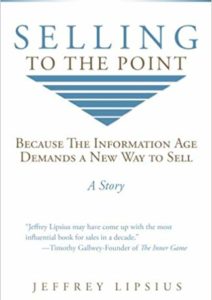I’m going to tell you something you’ll never hear your sales manager say: “Don’t try so hard.” Many salespeople think the harder they try the more they’ll succeed. It rarely works out that way and I want to explain why. It’s very important for salespeople to find a balance between making effort and over-trying to make effort. Salespeople tend to lean in favor of the latter. for successful selling it should be the other way around. For example, trying hard backfires while we’re negotiating. The negotiating party who shows the most desire puts himself in the the weakest bargaining position. Sociologists refer to this as, “The principle of least interest.” Professional purchasers are taught how to use the appearance of disinterest to their advantage as a negotiating tactic. It strategically puts one in a stronger negotiating position.
Putting salespeople in a weaker negotiating position is just the beginning of many potential pitfalls over-trying can create. Over-trying has deeper implications for salespeople. It drives to the very heart of sales performance itself, which is “focus of attention.” Our performance is dependent on our focus. Focus is required for observation, observation is required for learning, learning is required for performance. Focused salespeople are successful salespeople as long as they’re focused on the right thing.
When salespeople try hard to sell, it interferes with their focus. Their attention gets diverted away from where it should really be. During each sales interaction there are two different conversations salespeople can focus on. The first conversation is the one happening between the salesperson and the customer. The second conversation is the internal buying conversation taking place between the customer’s ears. A salesperson who’s trying hard to sell is primarily focused on the first conversation. This salesperson believes the customer’s decision to buy will depend largely on how hard the salesperson tries to sell. The second conversation, however, is more important. A salesperson’s commission is ultimately determined by the second conversation. This second conversation is where a salesperson should be primarily focused. Sales success is more about the customer’s buying performance than the salesperson’s selling performance. Salespeople can have a lackluster selling performance and still get the sale. All they need is a great customer buying performance. Salespeople can try hard to pull off a great selling performance but still leave empty handed. Their effort must be met with a good customer buying performance. Many sales happen without involving salespeople at all. If a salesperson didn’t try to sell and the customer bought anyway, did the salesperson do a good job? The answer is “yes.” The salesperson was wise enough to know when to keep his or her mouth shut.
Salespeople who think getting the sale depends on how hard they try have an exaggerated sense of grandiosity. They overestimate the importance their role plays in the customer’s decision process. This way of thinking is endemic within the selling profession. For example, I’m constantly hearing salespeople describe how their first priority is to establish rapport. First and foremost, they try to get customers to like them. I agree that it’s nice to have a friendly rapport with your customer. However, I can personally recall many instances when I bought products from salespeople I didn’t particularly like. I bought the products anyway because I felt they were the best products for me.
In reality, the act of trying negates the very thing we want to accomplish. How would it feel If someone said “I’m trying to like you.” I suspect it wouldn’t feel very good. Essentially this person is saying that he or she doesn’t like you. If you’re “trying” to sleep are you actually sleeping? If you’re “trying” concentrate are you concentrating? How would it feel if a salesperson said, “I’m trying to get you to like me.” Essentially this salesperson would be saying that his friendly demeanor is just a show that requires a lot of effort. It’s just part of the work he has to do to get you to buy the product.
Trying hard to sell sets salespeople up for downward negative performance spirals in the future. These negative spirals can lead to performance slumps exacerbated by self-doubt. I’ll explain the process. It starts with believing we’re responsible for the decisions of others. Thinking this way is a dual edged sword. It feels great when we tell ourselves that our customers bought because of us. We don’t actually know if that was truly the case, but we’ll tell ourselves that to pump ourselves up. We may even get a pat on the back from our manager. On the flip side of the same coin however, are the inevitable occasions when a customer won’t buy. Since we think customers buy because of us, we also think customers don’t buy because of us. If we experience a consecutive string of customers not buying, we begin to think there’s a pattern. Since we’re so self-focused, we make the pattern about us. We think we can improve the situation if we just try harder. Trying harder isn’t the answer because nothing was wrong with us in the first place. In fact, it makes things worse because we become even more focused on ourselves. What little focus was directed toward the customer is now lost. Eventually we start believing that we’re not the great salespeople we thought we were.
This pattern of thinking provides great job security for motivational speakers. We attend motivational speeches so we can recapture our positive thinking about ourselves. Motivational speakers brilliantly set themselves up for your next visit at their future presentations. They convince you that you’re great at getting people to buy. The seed of self-doubt is planted as soon as they convince you that you’re the reason customers will buy. They say it’s all about you and all you need to do is try harder. It’s just a matter of time before the self-doubt cycle repeats itself and you’re attending another one of their speeches.
Trying hard isn’t the salesperson’s answer to selling success because the answer to selling success lies with the customer. Salespeople won’t get a sale without their customer first deciding that salesperson will be getting the sale. When I’m watching a salesperson trying very hard to sell me it makes me feel suspicious. I wonder if there might be something wrong with the product. If it was truly a great product, wouldn’t this salesperson be more relaxed? I wonder, if the product is so great, why he or she can’t just show it to me. Wouldn’t the product’s merits be self-evident?
Consider what it’s like when a salesperson isn’t trying so hard. Salespeople who have a relaxed manner exude confidence. They’re transmitting to me that they know they have a good product. They enter the conversation believing it won’t be difficult to convince me to buy. They’re confident I’ll want to buy the product as soon as I hear about it. There’s no need for them to put on a show. They believe it makes so much sense for me to buy the product that my impression about salesperson himself isn’t important. Salespeople who don’t act like they’re trying hard to sell me appear more genuine.
I have the best rapport with salespeople who allow me to form whatever impression of them that I choose. These salespeople convey to me that the topic of conversation will be about my needs rather than theirs. They understand that the customer is one who has to do the “trying.” The customer has to try to make a decision about buying their product. Customers respond best to salespeople who will be on their team by helping them make the best decision. Instead of trying to take control, these salespeople let customers feel free to employ whatever decision process they choose. They offer support when the opportunity presents itself. Salespeople can’t notice when that opportunity arises unless they’re focused on their customers.
The downside of over-trying is a major training component for several famous professional sports coaches including Steve Kerr, Pete Carroll, and Tom Brady. This philosophy was originally introduced in the 1970s by Timothy Gallwey’s groundbreaking performance coaching book The Inner Game of Tennis.
Perhaps salespeople could benefit from Yoda’s advice as he was coaching Luke to be a Jedi. Yoda advised Luke, ”Do or do not, there is no try.” Goal clarity for salespeople is about securing a decision to buy. How hard you tried is a distracting side-agenda. Focus on the real goal of selling and may The (sales) Force will be with you.
Pipeliner CRM empowers salespeople to sell with minimal effort. Get your free trial of Pipeliner CRM now.















































Comments (1)
Very well written, Jeffrey and 100% agree. It’s how I have always been more successful – as a non-salesman! Obviously I want the sale, but not if it isn’t genuinely right for the client – that’s a recipe for a difficult and usually not-profitable relationship. Being sincere and passionate about what I have to offer is more than enough.